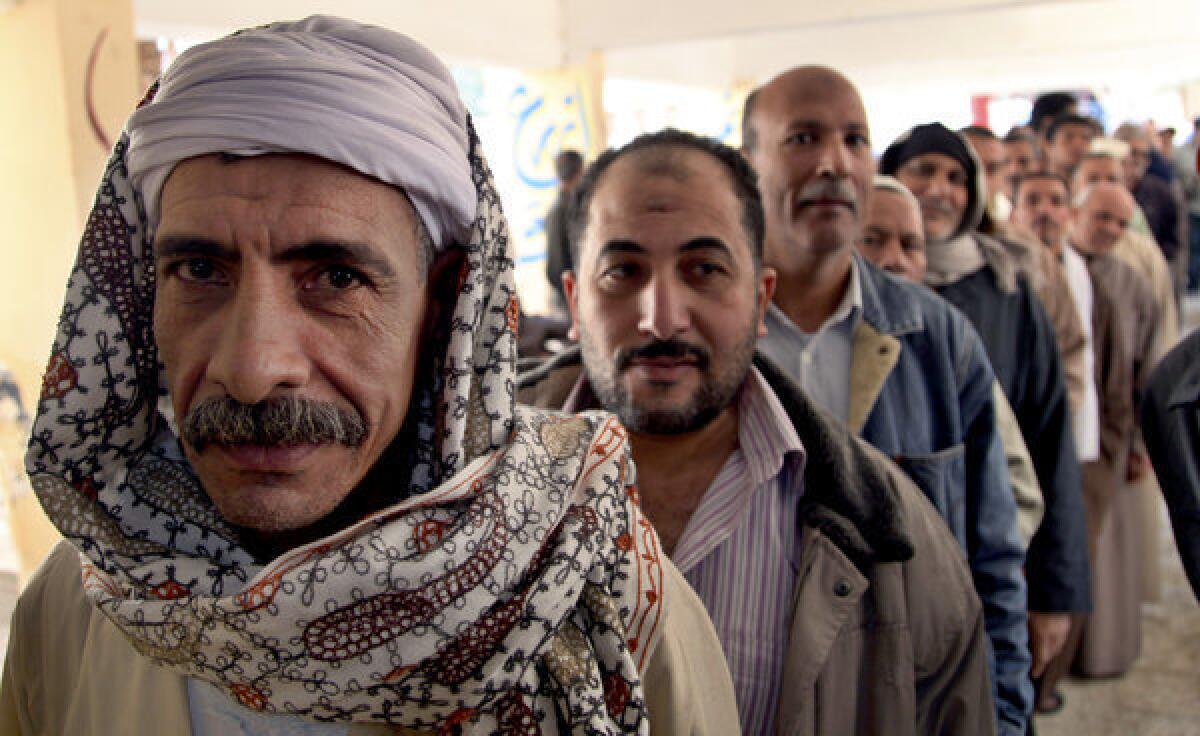Egyptians begin voting on controversial referendum

- Share via
CAIRO -- Egyptians began voting Saturday for a constitution that sharpens divisions between Islamists and secularists and intensifies the dangerous struggle over the country’s political identity nearly two years after the overthrow of Hosni Mubarak.
Voters stood in polling lines in slums and wealthy enclaves in an uninspired atmosphere on a day meant to enshrine hallowed ideals into law. Soldiers and police stood guard. Strong opinions muted any hint of consensus and most believed the country’s polarization would only deepen after the votes were counted.
“This constitution just isn’t right,” said Ayat Ahmed, a homemaker in a neighborhood of craftsmen and mechanics. “It doesn’t represent anyone so why are they trying to rush it through?”
The proposed charter, drafted by an Islamist-dominated assembly, symbolizes the failure of President Mohamed Morsi’s Islamist government to unify Egypt after 30 years of autocratic rule. The country has broken into two camps: Islamists who view the constitution as a gradual step toward sharia law and liberals who fear the document endangers freedom of expression and rights for workers, women and Coptic Christians.
Saturday’s voting encompassed Cairo and other cities in 10 governorates. Official results won’t be released until after a second day of balloting next Saturday. The constitution is expected to be approved.
The Muslim Brotherhood and its ultraconservative allies have campaigned for the charter in mosques and public squares in a grass-roots effort that may overwhelm the opposition.
“I read the constitution and I liked every article. It’s not because I’m from the Brotherhood,” said Hassan Ahmed, a government employee. “We’ve been living through instability for a year-and-a-half. The economy is suffering. ... We are ready to have a parliament. We want stability back.”
Turnout was sporadic among Egypt’s 51 million eligible voters: Hundreds of women – some peering through face veils, others wearing designer sunglasses, their hair uncovered – waited outside a school in a neighborhood of gardeners and luxury cars. In a faraway working-class neighborhood, laborers trickled into a polling station.
“We had 10 days to look at this constitution,” said Mohamed Gamal, owner of a clothing story in the poor Cairo district of Shubra. “Even the educated are not able to understand it in such a short period and we have a huge portion of society that is illiterate.”
The proposed constitution is not overtly Islamic. It mirrors the constitution under Mubarak by stating Egypt will be guided by the “principles” of sharia law. But new interpretive language and an article allowing clerics to be consulted on legislation have raised fears that conservative Islamists could manipulate the charter.
The proposed document galvanized a disparate opposition led by the National Salvation Front against concerns that Morsi, once a leader in the Brotherhood, is edging toward unrepresentative government.
“There can’t be one segment of society writing a constitution,” said Injy Maher, an accountant from Old Cairo, referring to the Brotherhood. “There is an article that states that we must live by family traditions, as if we aren’t already. Who gives the state the right to dictate what these family traditions should be? The hard-line Islamists want us to live by their rules. This is unacceptable.”
Morsi and the Brotherhood may win, but they will preside over a bitter nation and an economy in turmoil. The Brotherhood’s credibility among many Egyptians has been steadily slipping over its political opportunism, broken promises and Morsi’s move last month to put his office and the constitutional assembly beyond judicial oversight.
Many Egyptians, though, wonder when the power plays and political unrest will end.
“There shouldn’t be this kind of division when it comes to the constitution,” Maher Fakhry, a government employee. “After the revolution, we expected a constitution that would secure our rights. Some people will boycott because they are afraid there will be fraud, but boycotting is passive. We must all say no.”
He added: “After 30 years of oppression, we’ve had enough. Let our future generations live free.”
ALSO:
In China, victims in school attack survive
Global treaty becomes showdown over future of Internet
Japan elections revive questions about peaceful constitution
More to Read
Sign up for Essential California
The most important California stories and recommendations in your inbox every morning.
You may occasionally receive promotional content from the Los Angeles Times.











